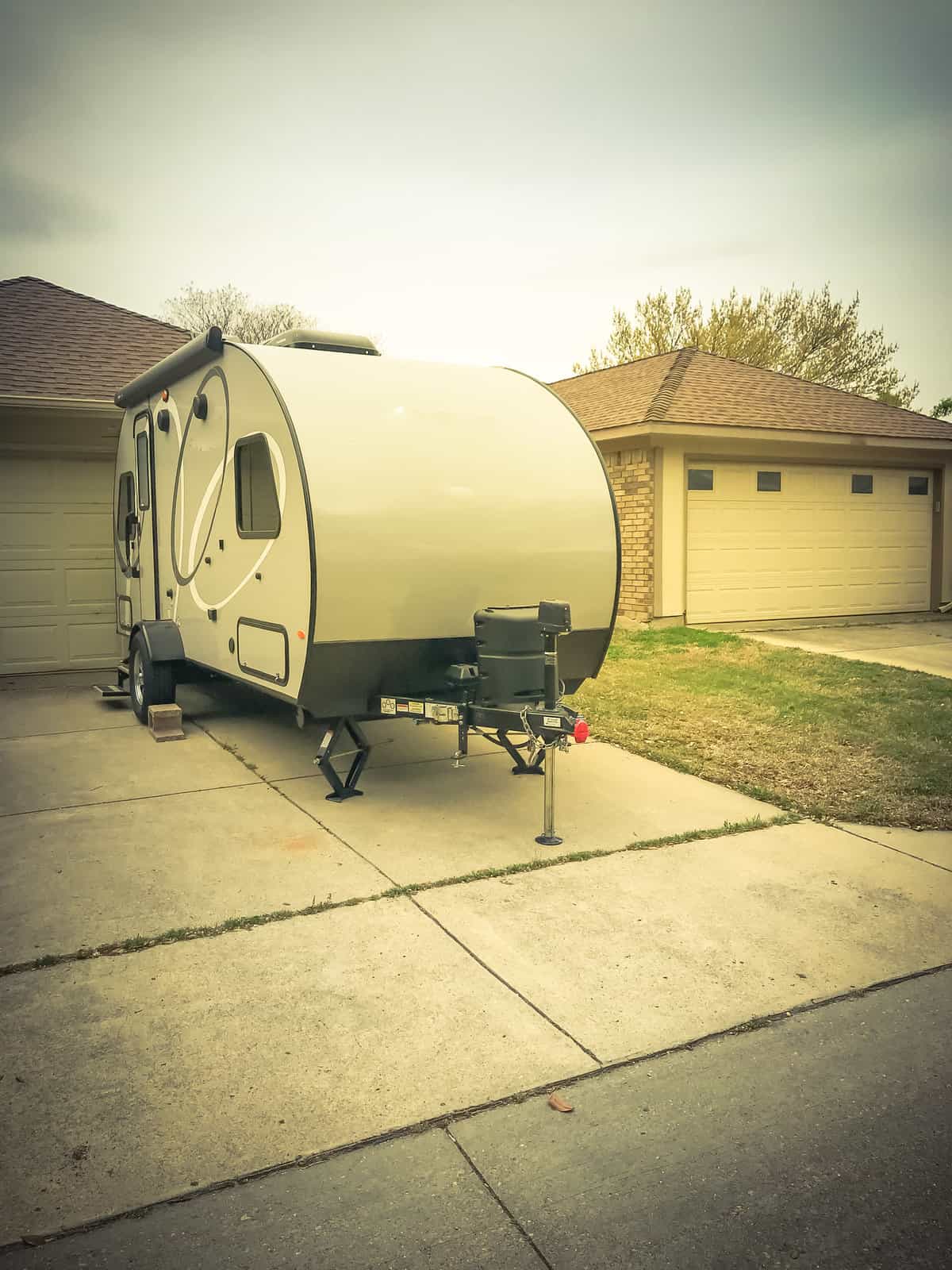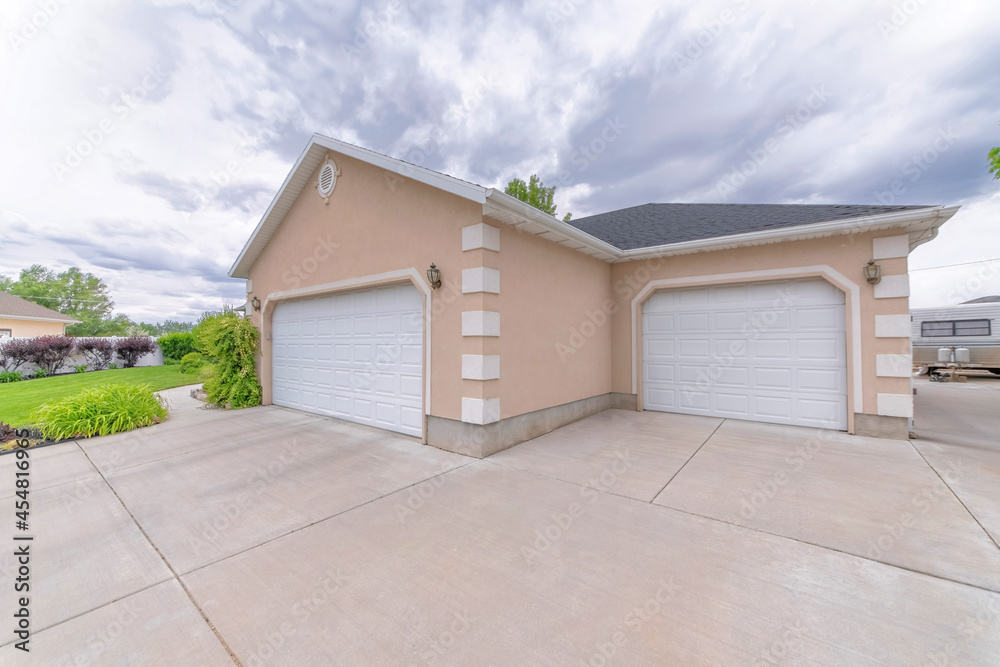The average RV storage facility costs between $75 to $250 per month. Costs can rack up pretty fast, considering that the average RVer spends just 20 to 28 days a year using their camper. In other words, most people pay for recreational vehicle storage for 11 months a year. And with the ever-rising storage fees, it’s no surprise that most RVers ask the question: “Can I park my camper in my driveway?” or “Can I park my RV in front of my house?” The answer is: It depends.
Read on to find out what to consider before choosing the driveway option, tips for parking an RV at home, and other parking alternatives if needed.
Can You Park Your RV on Your Driveway?
It’s totally possible to park your RV in the driveway if the local laws and homeowner association rules where you live allow it. Of course, you’ll also need to have enough space. However, there’s much more to consider. Keep reading to determine whether it’s possible to store your RV in the driveway.
Factors to Consider Before Parking Your RV in the Driveway
Use the following points to decide whether storing your camper in the driveway makes sense.
Local Ordinances
Local zoning laws are the first thing you need to consider before parking an RV in the driveway. Many urban jurisdictions have restrictions on parking recreational vehicles, oversized vehicles, inoperable vehicles, and water vessels on private property.
RV parking laws aren’t always obvious, so you’ll need to do some digging around to learn about the local regulations. Ignoring the law could lead to legal issues, including a citation and possibly a fine. Notably, RV owners in rural areas enjoy more relaxed local laws, which is good news if you want to store your camper at home.
Homeowners Association (HOA) Rules

HOAs are one of the major obstacles you’ll face when it comes to parking an RV on your residential lot. These community organizations make and enforce neighborhood rules and are well known for banning RV and boat storage on residential property.
Some HOAs set a maximum number of days you can store your camper in your driveway (mostly three), which means you can’t park your RV there long term. Others ban it altogether. Make sure you read the HOA handbook thoroughly to understand what restrictions related to parking your RV in your driveway might exist — and also what the penalties are.
Neighbors
Even if your residential neighborhood doesn’t have a HOA or local ordinances that prohibit parking campers, consider your neighbors before proceeding. If your driveway isn’t hidden by trees, your next-door neighbor might complain that your motorhome or travel trailer is an eyesore, even if it’s brand new.
Your neighbors may also be unhappy if your large camper somehow blocks a view they used to enjoy. On a positive note, there are neighborhoods where many people have RVs or boats in plain site on their property, so no one will mind if you store yours at home. To keep the peace, park your RV in the driveway out of public view, like at the side of the house or behind it.
Size of Your Driveway
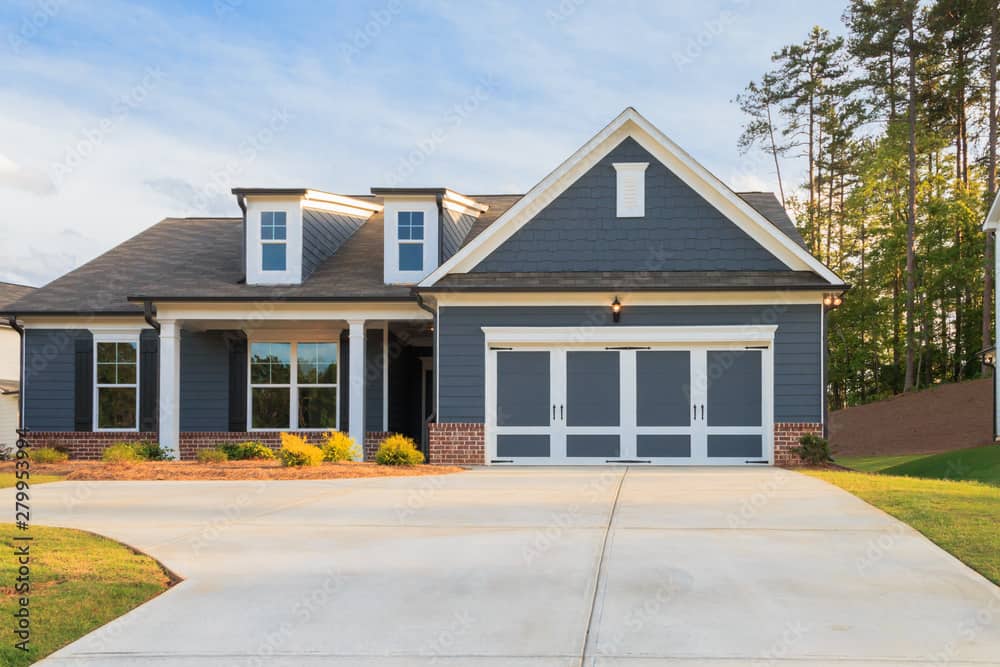
While your area may be RV-friendly, it’s always important to take into account the size of the driveway. You’ll need enough space to maneuver the camper without damaging your property or that of your neighbor. Plus, you’ll still require room for your other vehicles to access the garage.
Measure the length of your RV and the length of your driveway to ensure it won’t extend past the end of your driveway and over the public sidewalk. Next, measure the width to ensure a second car can still use the driveway and that your rig doesn’t encroach on your neighbor’s property. Finally, measure the height to determine whether your tall RV will strike overhead branches or low-hanging phone, cable, and power lines.
Driveway Slope
Beyond the usual measurements, you’ll want to consider the slope of your driveway. You don’t want to park it on a steep slope where it could potentially roll out of the driveway and onto the street or road, leading to property or personal damage. Also, a sharp incline means you’re likely to scrap your camper’s back bumper on the ground when pulling or backing into your driveway.
If your driveway is too steep, you may have to abandon the plan of parking at home or invest significant money to correct the gradient. A slope may be solved by resurfacing or reshaping the driveway to include a curve or zigzag. You can also improve the traction of your asphalt driveway with a sand seal.
RV Weight
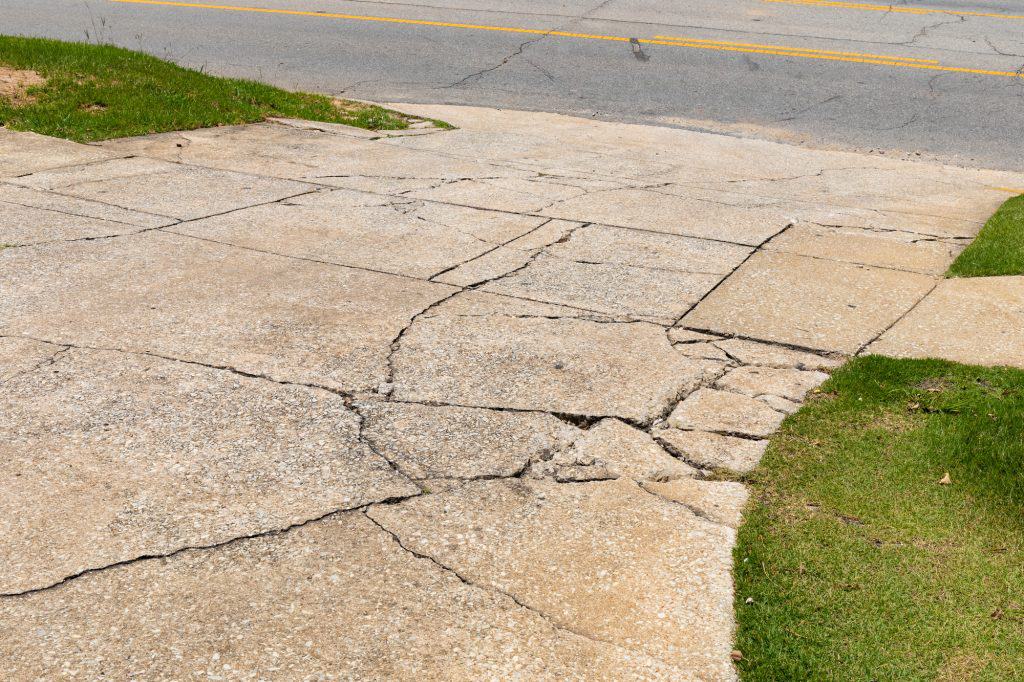
Weight is another key consideration before parking your camper in the driveway. That’s because most driveway surfaces can’t handle the weight of heavy rigs parked for extensive periods. The average driveway is poured 4 inches thick and can withstand up to 8,000 pounds.
Unfortunately, many motorhomes are above 10,000 lbs, which can easily crack your driveway. Consult a contractor about the recommended load limit of your driveway before parking. If it can’t support the camper’s weight, consider pouring a thicker slab (6 inches or more).
Security
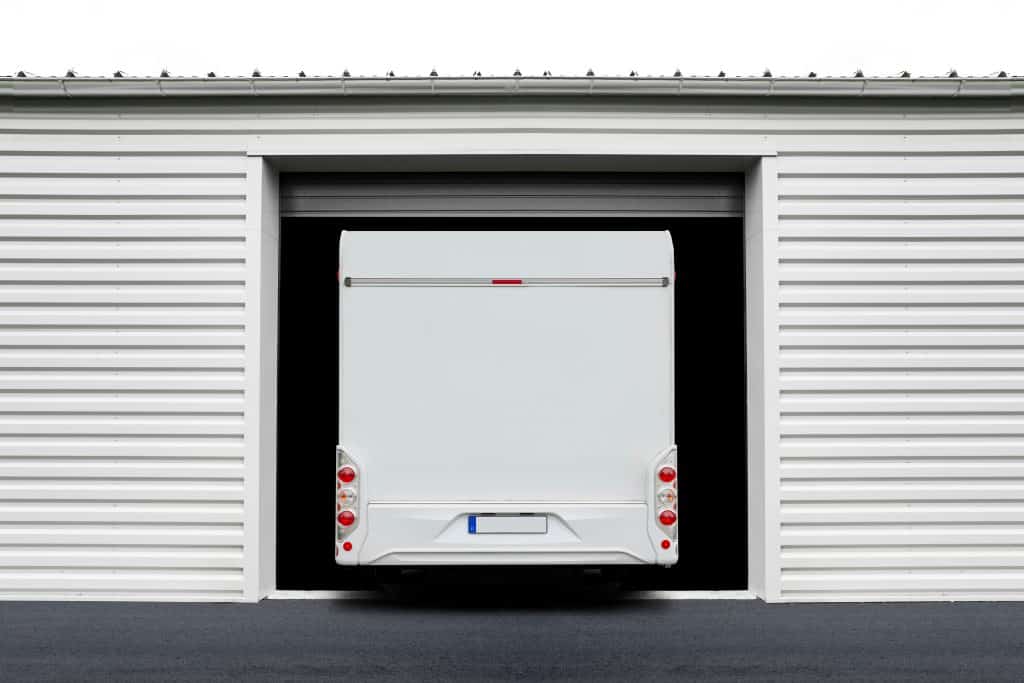
How safe is your neighborhood? Are there frequent cases of break-ins and vandalism? If so, you’re better off parking your RV in a dedicated storage facility. The last thing you want is to find the rig’s interior stripped of electronics and appliances, or, even worse, having the RV stolen. Assess the security situation before opting to park in residential areas.
Natural Hazards
Do you live in an area with frequent weather hazards? If your region experiences hurricanes, severe floods, or wildfires, you’ll need to store your RV in a safe indoor location far from your residence.
You can easily lose your RV to such natural disasters. Trees can fall on it during a storm, projectiles can strike it, or fires can destroy it. Areas with intense sunlight may also cause premature RV wear, while places with heavy rains could trigger rust and mold damage.
Tips for Parking a Camper in the Driveway
Use these tips to store your RV in the driveway parking.
Follow Local Rules
Make sure you’re in compliance with local zoning laws and HOA rules. If you aren’t sure, ask the local authorities and HOA.
Be a Considerate Neighbor
To maintain good relationships with your neighbors, make sure you alert them that you’ll be parking a camper in the driveway. Of course, make sure it isn’t encroaching on their space, don’t park it on residential streets, and keep it looking neat.
Don’t Create a Hazard for Drivers
If parking an RV in your driveway will prevent motorists from having a clear view of oncoming cars, cyclists or pedestrians, consider other parking options.
Expand Your Driveway

If it’s legal to store an RV of any length in front of your house, increase the size of your driveway to create more parking space. This will also generate more room for walking and maneuvering your cars.
Upgrade Your RV Security Features
Add proper lighting on the driveway, get an RV GPS tracker, install hitch locks on your trailer, place steering wheel locks, monitor the driveway with CCTV cameras, and don’t keep valuables inside the RV. Further, replace your standard RV lock with an electric combination lock and get an RV alarm.
Do Some Yard Maintenance
Trim any trees around the driveway to prevent branches from breaking off and falling on the RV. Frequent tree care can also eliminate birds and critters above your RV, preventing damage caused by droppings.
Protect Against Rodents
Close any small gaps mice may use to access the inside of your RV, remove any items that may attract rodents, and keep the lawn short.
Alternatives to Parking an RV in the Driveway
If you’re unsure of parking the RV in front of your house, here are other options to consider.
Commercial Storage Facilities
These are custom-built compounds for safeguarding RVs or boats. They can be as simple as a fenced parking lot or an indoor facility complete with a gated entrance, security guards, CCTV cameras, hookups, and climate control.
Rent a Peer-to-Peer Storage Space
Sites like Neighbor.com/rv-storage allow you to find neighbors with vacant storage space, such as an RV garage on their private property. This option can be nearly half the cost of traditional storage providers.
RV Park Storage
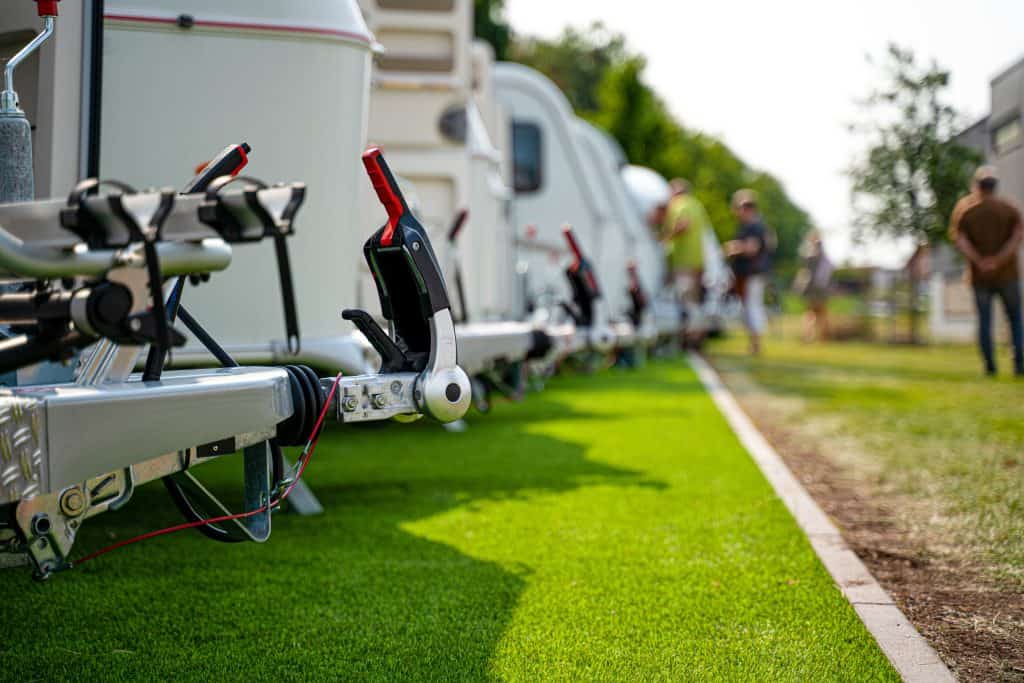
If you love returning to the same destination frequently, consider storing your RV at a campground that has a storage facility.
Construct an RV Garage
If you own a smaller to medium-sized motorhome or trailer, and you have the space, build it a custom garage. Make it a bit bigger in case you plan to upgrade to a slightly larger RV in the future.
Install a Carport
These types of sheds are more affordable, even though they don’t offer the same level of protection as a garage. They are great for storing bigger rigs.
Backyard Parking
If your backyard or side yard is spacious and hidden from public view, park your camper there and shield it from the elements with an RV cover. It’s a good idea to pour a concrete pad to protect the tires.
Rent it Out
When not using your RV, consider renting it out to other campers using sites like Outdoorsy.com and RVshare.com. This can be a brilliant way to earn passive income, repay your RV loan, offset ownership costs, and, of course, get it off your driveway.
So, Can I Park My Camper in My Driveway?
Along with the cost of living, inflation has also pushed up the cost of RV storage facilities. If you aren’t a full-time RVer, you are probably thinking of alternative ways to park your RV without incurring ridiculous monthly fees. One of the affordable options that come up is the driveway.
The good news is that it’s possible to utilize the front of your house as long as you do proper research regarding local laws, HOA rules, and the security situation. Further, determine your driveway’s size, slope, and weight-carrying capacity. In fact, those with a large yard can even add a small patio and hookups, which could be a great place for your overnight guests.
More From RV Top Tips
Cynthia Measom is the founder and main content creator of RV Top Tips. Not just a writer, she’s a dedicated RV owner and enthusiast, alongside her husband, Joe, who is an experienced RV tech. With their joint knowledge, the two are up on the latest trends and technologies in the RV industry, as well as practical camping and lifestyle tips.
The couple own a 2020 Coachmen Chaparral fifth-wheel that they absolutely love. Their secret to being so satisfied? They purchased the model after a solid year of researching different fifth-wheel campers in person and online to find the perfect fit for their family of three.

